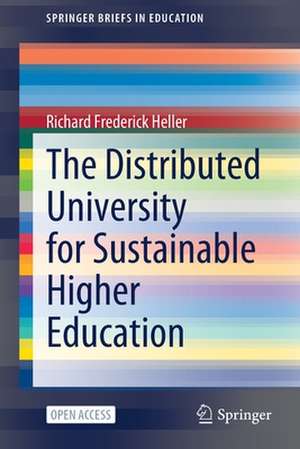The Distributed University for Sustainable Higher Education: SpringerBriefs in Education
Autor Richard Frederick Helleren Limba Engleză Paperback – 17 noi 2021
Din seria SpringerBriefs in Education
-
 Preț: 317.28 lei
Preț: 317.28 lei -
 Preț: 478.71 lei
Preț: 478.71 lei - 20%
 Preț: 387.43 lei
Preț: 387.43 lei - 17%
 Preț: 392.10 lei
Preț: 392.10 lei -
 Preț: 196.30 lei
Preț: 196.30 lei -
 Preț: 394.40 lei
Preț: 394.40 lei -
 Preț: 356.31 lei
Preț: 356.31 lei -
 Preț: 444.52 lei
Preț: 444.52 lei -
 Preț: 196.15 lei
Preț: 196.15 lei -
 Preț: 262.86 lei
Preț: 262.86 lei -
 Preț: 370.60 lei
Preț: 370.60 lei -
 Preț: 376.59 lei
Preț: 376.59 lei -
 Preț: 379.68 lei
Preț: 379.68 lei -
 Preț: 408.44 lei
Preț: 408.44 lei -
 Preț: 376.22 lei
Preț: 376.22 lei -
 Preț: 378.34 lei
Preț: 378.34 lei -
 Preț: 346.59 lei
Preț: 346.59 lei -
 Preț: 377.18 lei
Preț: 377.18 lei -
 Preț: 377.35 lei
Preț: 377.35 lei -
 Preț: 476.03 lei
Preț: 476.03 lei -
 Preț: 376.43 lei
Preț: 376.43 lei -
 Preț: 379.48 lei
Preț: 379.48 lei -
 Preț: 479.29 lei
Preț: 479.29 lei -
 Preț: 340.61 lei
Preț: 340.61 lei -
 Preț: 377.18 lei
Preț: 377.18 lei -
 Preț: 377.57 lei
Preț: 377.57 lei -
 Preț: 376.59 lei
Preț: 376.59 lei -
 Preț: 377.18 lei
Preț: 377.18 lei -
 Preț: 380.84 lei
Preț: 380.84 lei -
 Preț: 379.09 lei
Preț: 379.09 lei -
 Preț: 354.09 lei
Preț: 354.09 lei -
 Preț: 377.95 lei
Preț: 377.95 lei -
 Preț: 379.68 lei
Preț: 379.68 lei -
 Preț: 377.35 lei
Preț: 377.35 lei -
 Preț: 346.59 lei
Preț: 346.59 lei -
 Preț: 444.52 lei
Preț: 444.52 lei -
 Preț: 376.22 lei
Preț: 376.22 lei -
 Preț: 381.21 lei
Preț: 381.21 lei -
 Preț: 348.13 lei
Preț: 348.13 lei -
 Preț: 409.25 lei
Preț: 409.25 lei -
 Preț: 410.17 lei
Preț: 410.17 lei -
 Preț: 377.57 lei
Preț: 377.57 lei -
 Preț: 380.63 lei
Preț: 380.63 lei -
 Preț: 376.59 lei
Preț: 376.59 lei -
 Preț: 377.57 lei
Preț: 377.57 lei -
 Preț: 380.07 lei
Preț: 380.07 lei -
 Preț: 378.54 lei
Preț: 378.54 lei -
 Preț: 379.48 lei
Preț: 379.48 lei -
 Preț: 377.73 lei
Preț: 377.73 lei -
 Preț: 342.74 lei
Preț: 342.74 lei
Preț: 258.45 lei
Nou
Puncte Express: 388
Preț estimativ în valută:
49.45€ • 51.77$ • 40.92£
49.45€ • 51.77$ • 40.92£
Carte tipărită la comandă
Livrare economică 05-19 aprilie
Preluare comenzi: 021 569.72.76
Specificații
ISBN-13: 9789811665059
ISBN-10: 9811665052
Pagini: 80
Ilustrații: XII, 80 p. 16 illus., 13 illus. in color.
Dimensiuni: 155 x 235 mm
Greutate: 0.15 kg
Ediția:1st ed. 2022
Editura: Springer Nature Singapore
Colecția Springer
Seria SpringerBriefs in Education
Locul publicării:Singapore, Singapore
ISBN-10: 9811665052
Pagini: 80
Ilustrații: XII, 80 p. 16 illus., 13 illus. in color.
Dimensiuni: 155 x 235 mm
Greutate: 0.15 kg
Ediția:1st ed. 2022
Editura: Springer Nature Singapore
Colecția Springer
Seria SpringerBriefs in Education
Locul publicării:Singapore, Singapore
Cuprins
Preface.- Some context: from first to fourth generation universities.- The problem with universities today.- Solutions.- But how can we afford it?.- A case study – Peoples-uni, and Conclusions.
Notă biografică
Emeritus Professor Richard Heller has a medical degree and doctorate from the University of London, United Kingdom. He was Professor of Clinical Epidemiology and Community Medicine, and Director of The Centre for Clinical Epidemiology and Biostatistics at the University of Newcastle, Australia, and consultant general physician at the John Hunter Hospital until the year 2000. From there, he was Professor of Public Health in the University of Manchester, United Kingdom, until his retirement in 2006. Richard has had a leadership role in the International Clinical Epidemiology Network, an organisation originally funded by the Rockefeller Foundation, for capacity building in medical schools across the developing world, and developed a distance learning masters course in the University of Newcastle. He subsequently built a fully online masters course in Public Health at the University of Manchester, United Kingdom. Richard was also the founder and coordinator of the People's Open Access Education Initiative (Peoples-uni), which aimed to provide Public Health capacity building in developing countries at low cost, through e-learning using open access resources on the Internet, and leading to an MPH degree. His research interests have been in the causes and prevention of heart disease, the implementation of evidence-based practice, and developing measures to describe the population impact of disease risks and the benefits of interventions.
Textul de pe ultima copertă
This book is open access and discusses the re-imagining of the higher education sector. It exposes problems that relate to the way that universities have become over-managed business enterprises which may not reflect societal, national, or global educational needs. From there, it proposes some solutions, including three innovative programs, that make universities more responsive to needs, as well as reduce their impact on the environment. The central idea of this book is developing the ‘Distributed University,’ which distributes education to where it is needed, reducing local and global inequalities in access, and emphasizing local relevance in place of large centralized campuses, with a low impact on the environment. It emphasizes the distribution of trust in place of managerialism and collaboration in place of competition. By focusing on distributing education online, this book discusses how the higher education sector can be set up to adapt to the changes in the ways we work and learn today, and which will be required to adapt to and take advantage of the Fourth Industrial Revolution.
Caracteristici
Is open access and provides a comprehensive review of the problems facing universities in contemporary times Presents ideas that reflect the possibilities offered by modern technology and learning methods Discusses how a “Distributed University” reduces local and global inequalities in access
